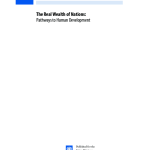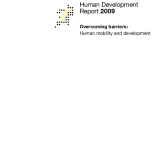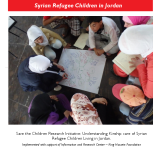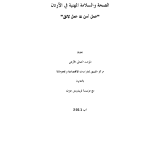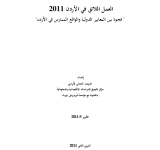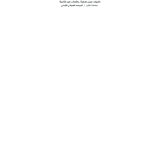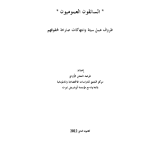work
Migration;; both within and beyond borders;; has become an increasingly prominent theme in domestic and international debates;; and is the topic of the 2009 Human Development Report (HDR09). The starting point is that the global distribution of capabilities is extraordinarily unequal;; and that this is a major driver for movement of people. Migration can expand their choices —in terms of incomes;; accessing services and participation;; for example— but the opportunities open to people vary from those who are best endowed to those with limited skills and assets. These underlying inequalities;; which can be compounded by policy distortions;; is a theme of the report. The report investigates migration in the context of demographic changes and trends in both growth and inequality. It also presents more detailed and nuanced individual;; family and village experiences;; and explores less visible movements typically pursued by disadvantaged groups such as short term and seasonal migration.
his 2005 Human Development Report takes stock of human development;; including progress towards the MDGs. Looking beyond statistics;; it highlights the human costs of missed targets and broken promises. Extreme inequality between countries and within countries is identified as one of the main barriers to human development—and as a powerful brake on accelerated progress towards the MDGs. The report suggests that the world's governments are faced with a choice. They can start a decade for development with the financial resources;; technology and capacity to end poverty or we could have a human development failure. “Business as usual” will not allow fulfilling the promises and the commitments made in 2000. The cost of this failure will be measured in human lives;; increased inequalities;; violations of human rights and threats to peace.
Throughout history water has confronted humanity with some of its greatest challenges. Water is a source of life and a natural resource that sustains our environments and supports livelihoods – but it is also a source of risk and vulnerability. In the early 21st Century;; prospects for human development are threatened by a deepening global water crisis. Debunking the myth that the crisis is the result of scarcity;; this report argues poverty;; power and inequality are at the heart of the problem.The 2006 Human Development Report continues to frame debates on some of the most pressing challenges facing humanity.
يهدف هذا التقرير إلى تقديم قراءة تقييمية لواقع الصحة والسلامة المهنية في بيئة الأعمال الأردنية;; تتضمن قراءة في التشريعات الأردنية الخاصة بالصحة والسلامة المهنية;; إلى جانب استعراض لأبرز المعايير الدولية ذات العلاقة;; إضافة إلى تقديم قراءة لمدى موائمة التشريعات الأردنية مع المعايير الدولية في هذا المجال;; كما اعتمد التقرير في منهجيته على تحليل البيانات الاحصائية المتاحة حول الصحة والسلامة المهنية واصابات العمل;; وكما تم اجراء مقابلات مع بعض رؤساء النقابات العمالية;; وذلك إلى جانب مراجعة المعلومات والأخبار الصحية التي تناولت هذا الموضوع. ويقدم التقرير مجموعة من التوصيات التي من شأنها تحسين شروط الصحة والسلامة المهنية للعاملين في الأردن.
إن هذا التقرير يحليل واقع تطبيق معايير العمل اللائق في الأردن على مستويين;; يتمثل المستوى الاول في فحص التشريعات العمالية الأردنية المتمثلة في قانون العمل الاردني وقانون الضمان الاجتماعي وغيرها من الانظمة والتعليمات والقرارت ذات العلاقة بالعمل. أما المستوى الثاني من التحليل فيتمثل في فحص واقع التطبيق الفعلي لمعايير العمل اللائق سواء كانت واردة في التشريعات الاردنية ذات العلاقة أم لا. كما قدم التقرير مجموعة من التوصيات لتحسين واقع العمل الممارس في الاردن .
يأتي هذا التقرير في إطار سلسة التقارير الدورية التي يصدرها المرصد العمالي الأردني;; أحد برامج مركز الفينيق للدراسات الاقتصادية والمعلوماتية;; والتي تتناول ظروف العمل في العديد من القطاعات الاقتصادية المختلفة;; في إطار خطة عمل تهدف إلى تغطية القطاعات العمالية التي يعاني فيها العاملين لانتهاكات تمس حقوقهم الأساسية. و.يهدف هذا التقرير الى استعراض الظروف التي يعمل فيها العاملون في الجمارك الأردنية من حيث الأجور والعلاوات;; والاستقرار الوظيفي;; ومدى توفر معايير الصحة والسلامة المهنية;; وغيرها من الحقوق العمالية الأساسية التي نصت عليها التشريعات الأردنية والدولية ذات العلاقة.
لقد تم إعداد هذا التقرير الخامس حول أوضاع مراكز الإصلاح والتأهيل من اجل تقييم هذه المراكز والنزلاء واماكن التوقيف والموقوفين;; وكما يكشف التقرير عن مواطن الضعف والخلل التي تعاني منها هذه المرافق. وتم الاستناد على منهجية الزيارات الميدانية الفجائية إلى تلك الاماكن;; والالتقاء بالنزلاء والموقوفين;; وكما استند التقرير أيضاً على الالتقاء بنزلاء وموقوفين سابقين وأسر بعض النزلاء الحاليين ونشطاء من المجتمع المدني.
